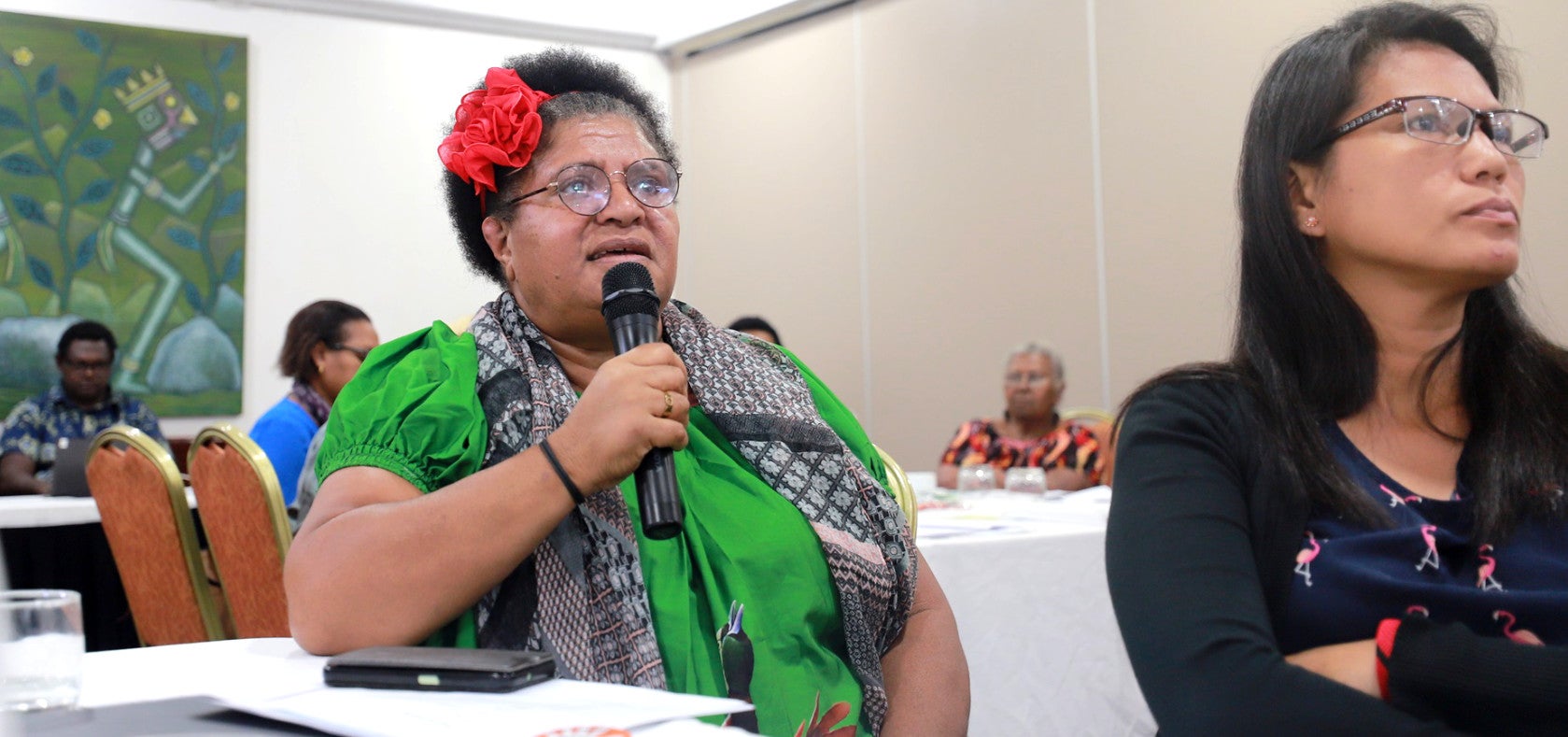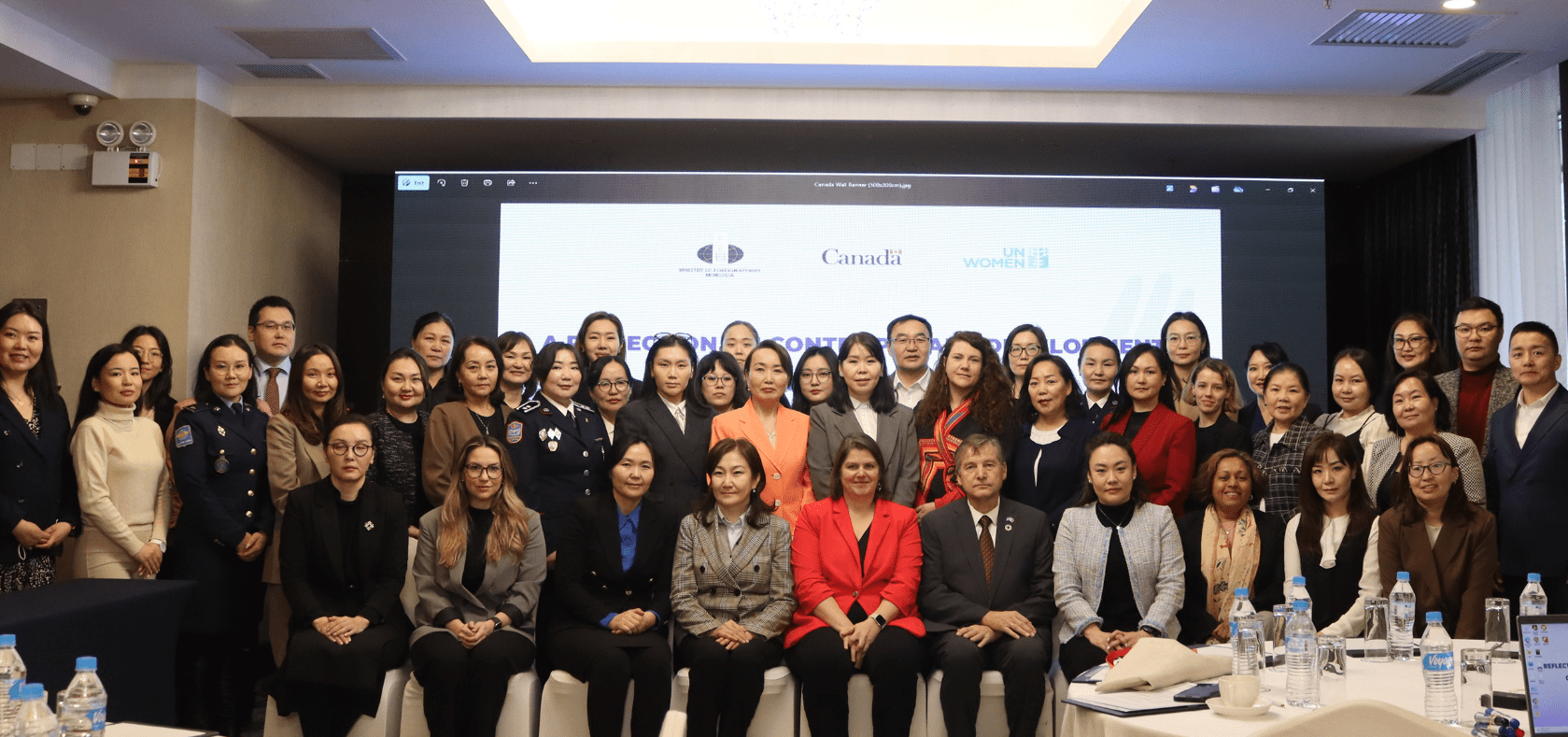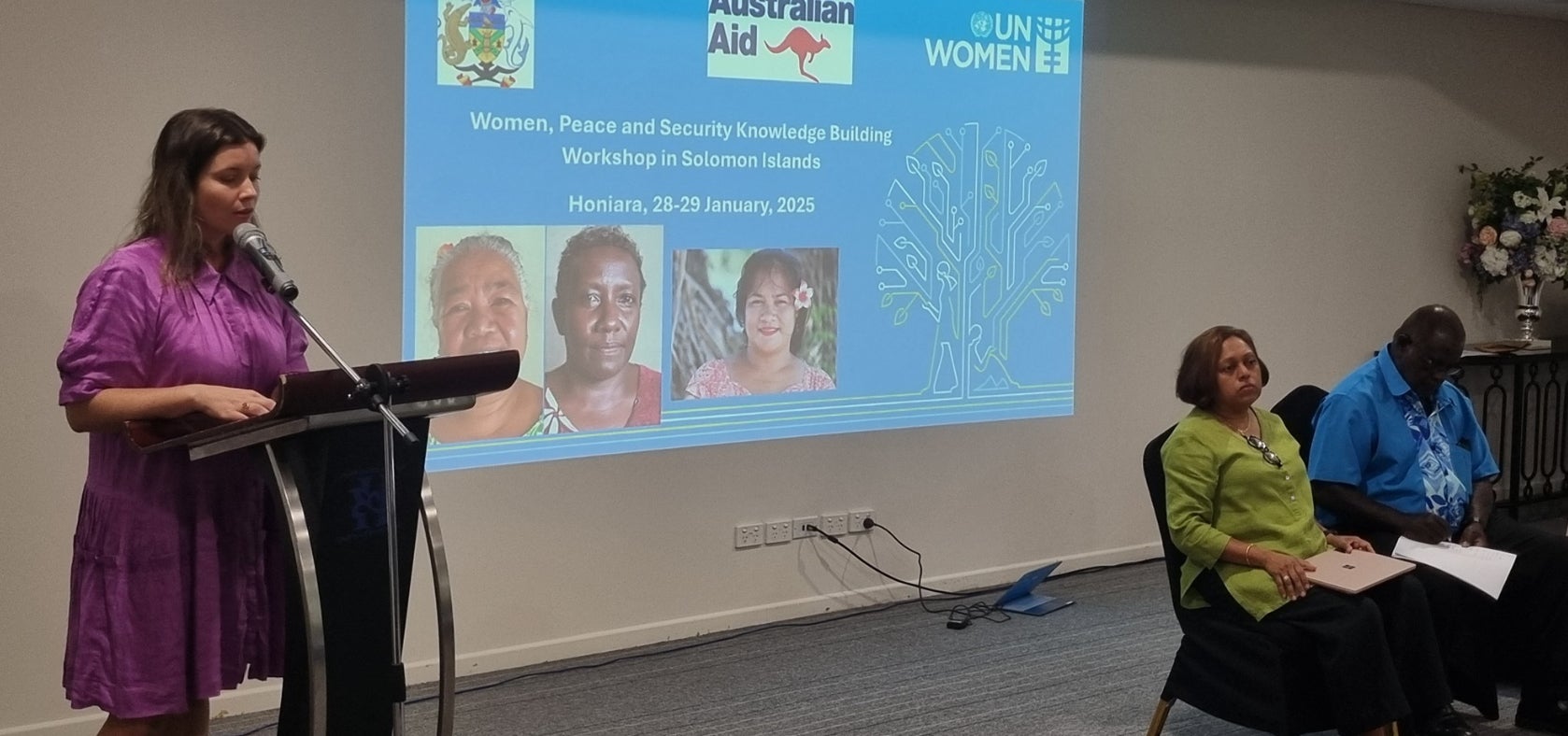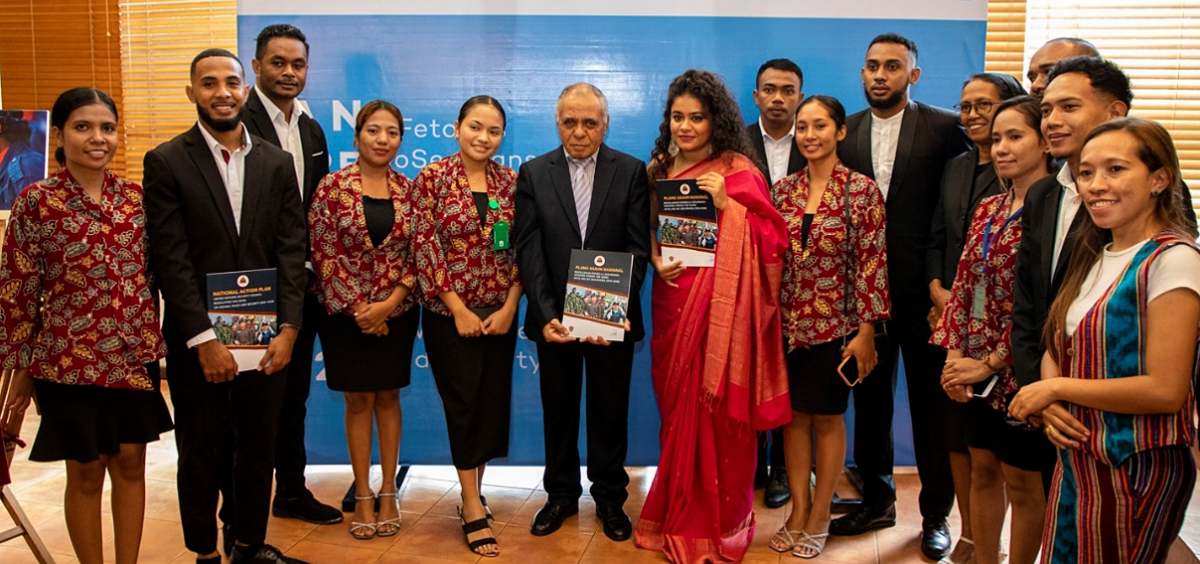
National Action Plans: Women, Peace and Security

National action plans (NAPs) are practical documents that detail the actions a government is taking to meet its obligations under the ten UN Security Council Women, Peace and Security (WPS) resolutions and other internationally agreed-upon resolutions. NAPs ensure that governments translate these commitments into concrete policies and programmes. NAPs also provide valuable accountability tools for states and civil society.
NAPs provide opportunities for national stakeholders to convene around a planning tool that identifies priorities, determined responsibilities, allocates resources and initiates strategic actions within a defined timeframe to deliver policies and programmes that respond to the needs and priorities of conflict and crisis-affected women and communities from a gender perspective.
Over the past five years, UN Women has provided technical and financial support to governments, women-led organizations and CSOs at the national and local levels in several countries in the region. This targeted support helped develop, implement and monitor NAPs WPS through inclusive processes that reflected women’s diverse experiences, priorities and voices. Recently, there has been an increased interest in including emerging and non-traditional WPS issues such as climate change and cybersecurity in NAP on WPS.
Globally, as of July 2023, 107 countries and territories had adopted NAPs.
As of September 2024, the following 13 countries in Asia and the Pacific have formulated these important plans. Other countries in the region are currently developing NAPs. The links are to English versions of documents unless otherwise indicated:
- Afghanistan - first NAP (2015-2022) with Phase I 2015-2018, Phase II: 2019-2022
- Australia - first NAP (2012-2018) | second NAP (2021-2031)
- Bangladesh - first NAP (2019-2022)
- Indonesia - first NAP (2014-2019) | second NAP (2020-2025)
- Japan - first NAP (2015-2018) | second NAP (2019-2022) | third NAP (2023-2028)
- Nepal - first NAP (2011- 2016) | second NAP (2022-2025)
- New Zealand - first NAP (2015-2019)
- The Philippines - first NAP (2010-2016) including second revision | third NAP (2017-2022) | fourth NAP (2023-2033).
- Republic of Korea - first NAP (2014-2017) | second NAP (2018-2020) | third NAP (2021-2023) | fourth NAP (2024-2027)
- Sri Lanka - first NAP (2023-2027)
- Solomon Islands - first NAP (2017-2021)
- Timor-Leste - first NAP (2016-2020) | second NAP (2024-2028)
- Viet Nam - first NAP (2024-2030) (Vietnamese version only)
At the regional level, there is a Pacific Regional Action Plan (2012–2015), which has finalized its term. The Association of Southeast Asian Nations (ASEAN) has adopted in late 2022 a Regional Plan of Action.
The priorities and actions identified within NAPs in the WPS framework commonly integrate the four pillars of the WPS Agenda. These pillars encompass women’s participation at all levels of decision-making in the peace and security sphere; incorporate gender perspectives into conflict-prevention initiatives; protect the rights of women and girls; and ensure that gender considerations are integrated into relief and recovery efforts. Within these pillars, context-specific provisions could address the following areas:
- Conflict Prevention at all levels
- Constitutional and Electoral Reform
- Disarmament, Demobilization and Reintegration (DDR) of Combatants
- Humanitarian Response: Refugees and Internally Displaced Persons
- Peace Negotiations and Peace Agreements
- Peacekeeping Operations
- Post-conflict Rehabilitation, and Truth and Reconciliation
- Preventing and Responding to Gender-Based Violence
- Security Sector Reform
- Women’s meaningful participation and leadership
- Gender, security and climate change
- Gender and cybersecurity and the digital space.
More countries are now mentioning security risks, such as climate change and cybersecurity, in their NAPs. Climate, peace and security, and digital security are key emerging areas UN Women is addressing through the Regional Framework Towards Peaceful, Inclusive Societies in Asia and the Pacific.
There are countries in the region that have demonstrated political will, allocated resources and undertaken considerable efforts to adopt or currently develop NAPs on WPS. UN Women has supported these efforts by providing technical and financial support for the formulation and implementation of NAPs across Asia and the Pacific region.
Bangladesh
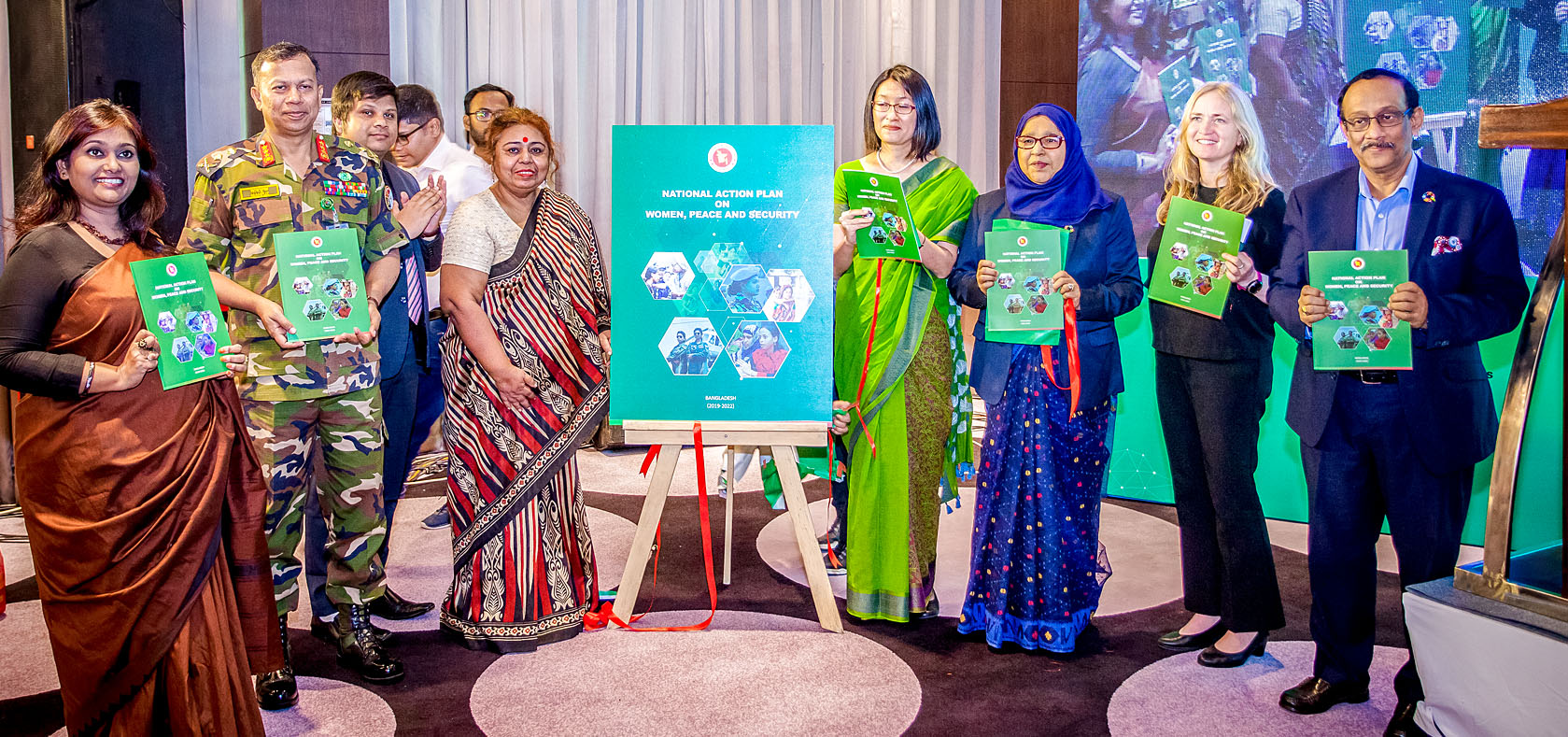
UN Women, with the support of the governments of Japan and Australia, providing technical support to the Ministry of Foreign Affairs to develop and implement the NAP on WPS. UN Women also contributed to enhancing the capacity of involved actors (particularly government agencies and women’s organizations) to participate in the development of the NAP, thus ensuring an inclusive and participatory process that reflected women’s experiences and voices.
A series of UN Women-supported community consultations resulted in the formulation of more than 150 recommendations on WPS. In addition, UN Women, together with Bangladesh Nari Progati Sangha (BNPS), strengthened the capacities of grass-roots women leaders to contribute to the localization of the NAPs. Over 120 participants from women-led CSOs and youth activists have strengthened their knowledge of and capacity to address WPS issues and the NAP on WPS. UN Women continues its national- and local-level support for the effective implementation, monitoring and reporting on the NAP on WPS by building institutional capacities and facilitating dialogue between the government and CSOs.
Key publications:
- Press release — Bangladesh Commits to Ensure Women’s Meaningful Participation in Peace and Security Efforts (2018)
- Story and Video explainer — Bangladesh launches first National Action Plan on women, peace and security as per UN resolutions and video (2019)
- Story — Youth Voices on the 20th Anniversary of UN Security Council Resolution 1325 on Women Peace and Security (2020)
- Story — Women’s meaningful participation essential to peace: Bangladesh commemorates 20 years of UN Security Council Resolution 1325 on Women Peace and Security (2021)
Indonesia
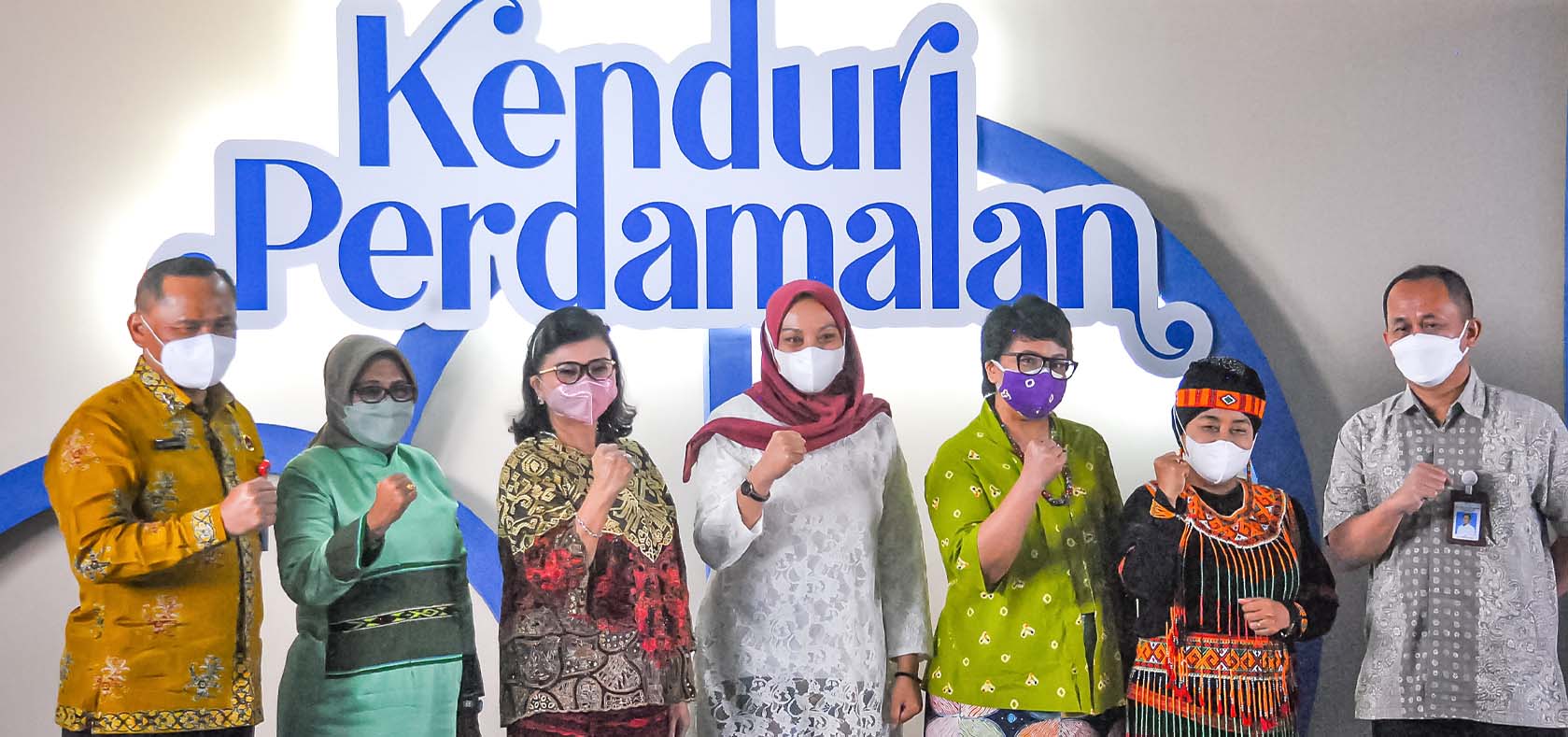
UN Women supports the Ministry of Women Empowerment and Child Protection (MoWECP) to strengthen and establish an accountability mechanism for RAN P3AKS II (Rencana Aksi Nasional Perlindungan dan Pemberdayaan Perempuan dan Anak dalam Konflik Sosial; the NAP for the Protection and Empowerment of Women and Children in Social Conflict (2020–2025). The NAP acts as a second phase of the RAN P3AKS, which outlines Indonesia’s commitments under the WPS framework. RAN P3AKS II aims to enhance accountability, strengthen collaboration, and stronger implementation to enable women’s groups, young women and women with disabilities to meaningfully participate in and shape more equitable and inclusive peacebuilding.
UN Women has provided technical assistance to MoWECP to advance the WPS agenda at the national and subnational levels and to strengthen the infrastructure of the joint secretariat, which supports the synergy between policymakers and civil society for effective implementation. Assistance included a strategic planning workshop to identify NAP WPS priorities and training on protecting women’s and children’s rights during social conflict.
Key publications:
- Press release — Indonesia holds Peace Festival to reaffirm its commitments to Women, Peace and Security (2022)
- Story — UN Women works with the government and civil society on training to protect women and children from conflicts in Aceh, Indonesia (2022)
- Explainer video — Strengthen the Women, Peace and Security (WPS) agenda in Indonesia through RAN P3AKS II (2021)
Sri Lanka
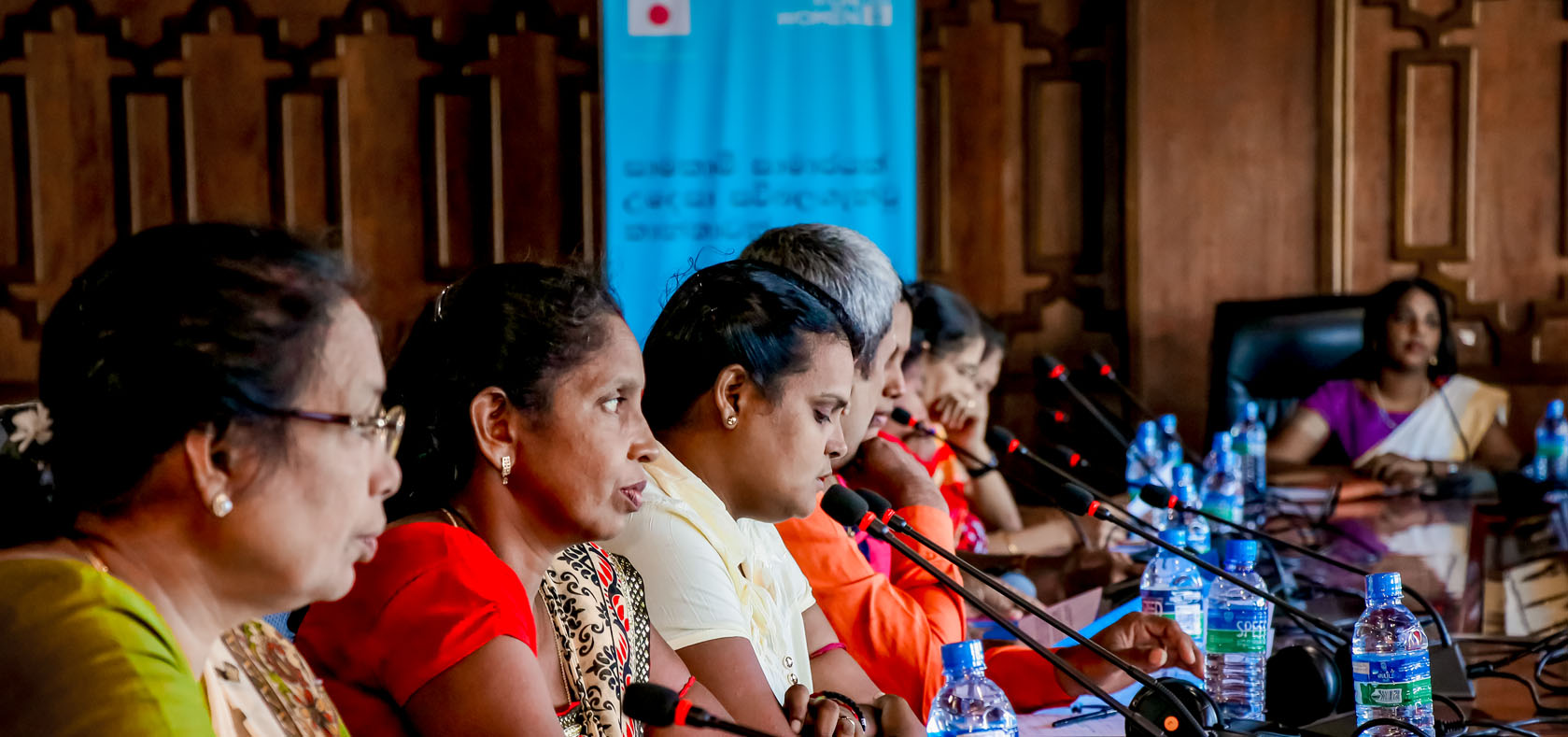
UN Women, with financial assistance from the Government of Japan, provided technical support for the formulation and validation of the country’s first NAP on WPS in Sri Lanka. The NAP was formulated under the leadership of the Ministry of Women, Child Affairs and Social Empowerment. The NAP responds to the needs and priorities of women affected by conflict and crises, highlights the importance of women’s equal participation in maintaining peace and security and addresses the structural inequalities that impede gender equality in the country.
In 2019, the Ministry of Women and Child Affairs with the support of UN Women conducted consultative dialogues in all nine provinces in Sri Lanka to identify key NAP priorities. The dialogues included voices from the district- and divisional-level government officials, civil society and community-based organizations, religious leaders, women leaders and those with direct experiences of conflict and crises. In 2021, the draft NAP underwent multi-stakeholder validations, including from the G7+ working group on Women, Peace and Security in Sri Lanka, development partners and UN agencies. The NAP WPS for the period 2023 – 2027 has been approved by the Cabinet in late February 2023 and launched on 8 March 2023.
Key publications:
- Sri Lanka’s National Action Plan for the Implementation of the UN Security Council’s Resolutions on Women, Peace and Security 2023–2027 | English | සිංහල (Sinhala) | தமிழ் (Tamil)
- Press Release — Sri Lanka adopts the first National Action Plan on Women, Peace and Security on 8 March 2023.
- Press Release — Validations begin for Sri Lanka’s first-ever National Action Plan on Women, Peace and Security (2021)
- Op-Ed — Why women, peace and security for COVID-19 recovery? (2021)
- Story — Serving women and children gives me hope for the future (2022)
- Story — In the words of Kaushalya Hapuarachchi: “To ensure legal action, we must ensure the safety of the survivors of violence and witnesses” (2022)
Timor-Leste
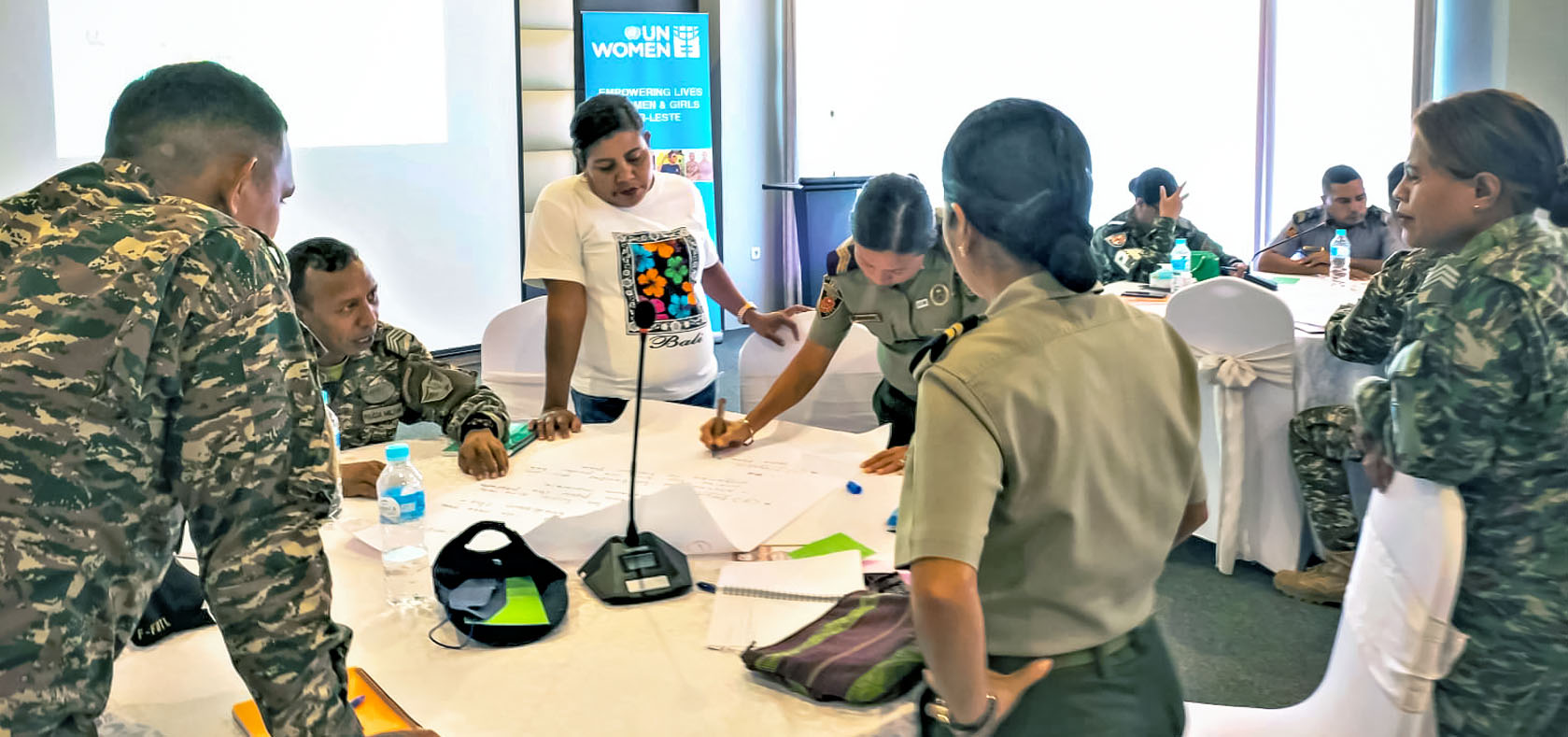
UN Women has been supporting the Government of Timor-Leste since the 2013 development and implementation of the first NAP on UNSCR 1325 on Women, Peace and Security 2016–2020 (NAP 1325). In 2021, under the leadership of the Ministry of Interior, the government initiated the development of a second phase, NAP 1325 2022–2025.
UN Women, with generous support from the Swedish International Development Cooperation Agency and the Government of Australia’s Department of Foreign Affairs and Trade, provided technical and capacity development support to the NAP 1325 2022–2025 Secretariat. UN Women collaborated with relevant line ministries and CSOs to strengthen local- and national-level inclusive and participatory community consultations. The new NAP structure brings together 15 line ministries and ensures the official participation of 14 CSOs. The second generation of the NAP was launched on 16 February 2024. See story and link to publication below.
Key publications:
- Story, 16 Feb 2024 - Timor-Leste launches 2nd generation of its National Action Plan 1325 on Women, Peace and Security
- Publication — National Action Plan United Nations Security Council Resolution 1325 (2000) on Women, Peace And Security (2024 -2028)
- Story — Investing in women for peace and future generations: Timor-Leste Adopts a National Action Plan on Security Council Resolution 1325 (2016)
- Story of change — Women, Peace and Security: Story of Change and Progress from the Implementation of NAP 1325 (2022; Tetum only)
